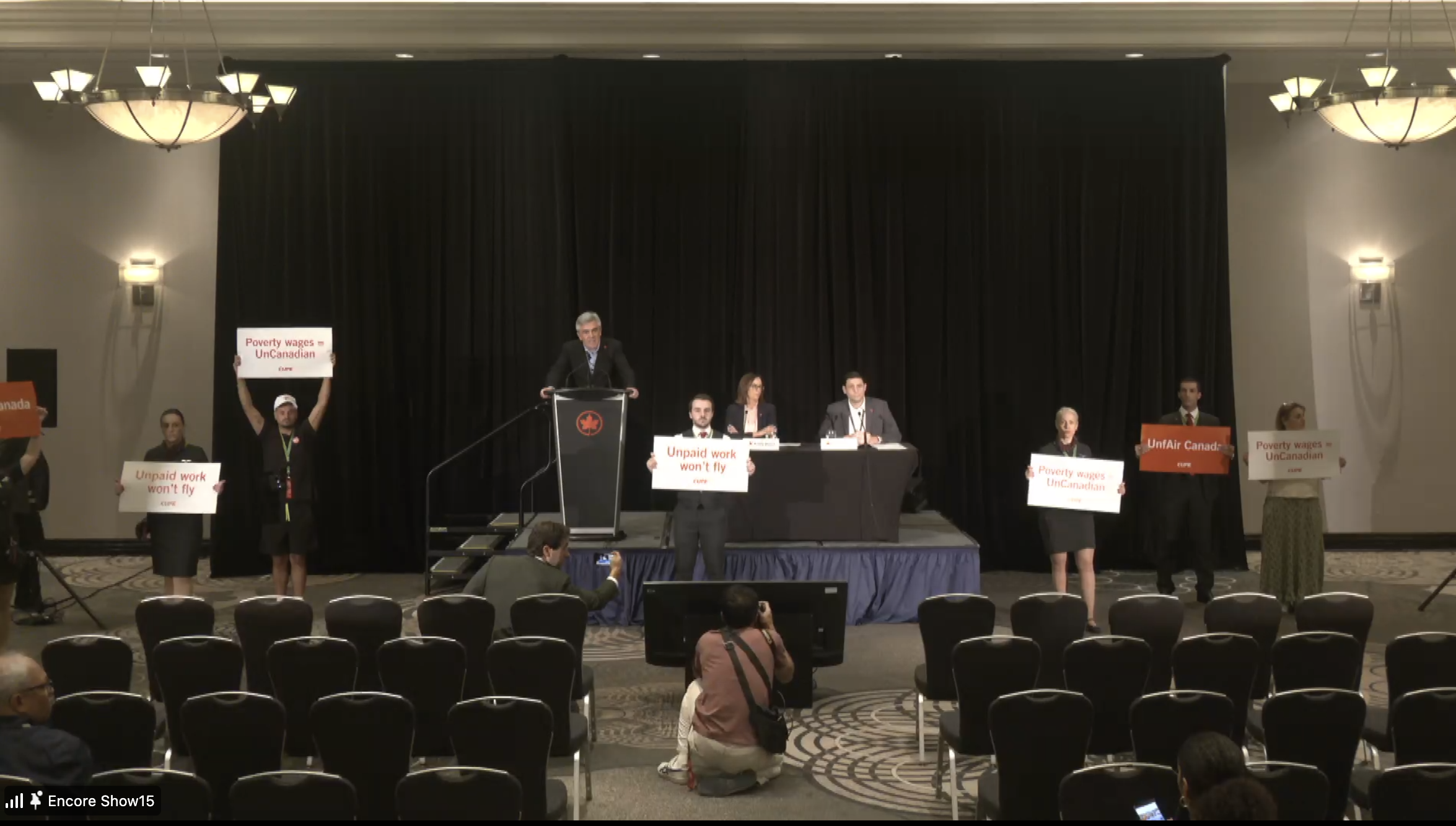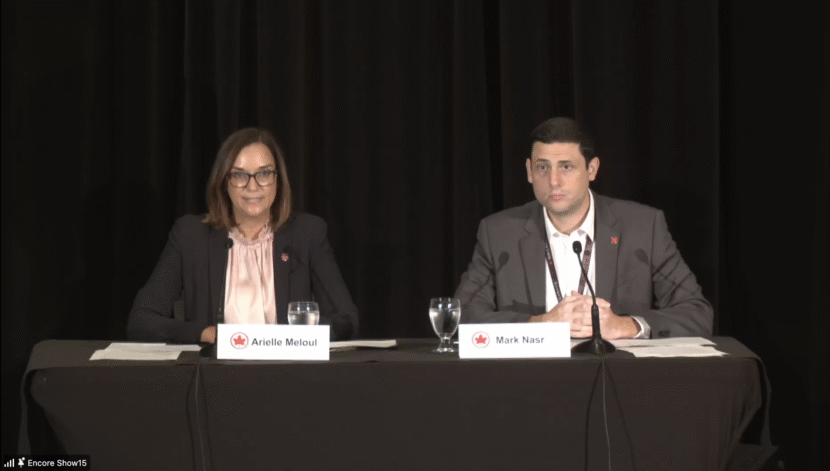TORONTO — It was a dramatic end to Air Canada’s press conference this morning, with CUPE representatives interrupting the briefing and heightening the tension surrounding their ongoing labour dispute.
Taking place on Aug. 14 at Sheraton Toronto Airport Hotel, the conference was hosted by Arielle Meloul-Wechsler, Air Canada’s Executive Vice President, Chief Human Resources Officer and Public Affairs, and Mark Nasr, Air Canada’s Executive Vice President and Chief Operations Officer, who addressed the airline’s negotiations with CUPE, which represents 10,000 flight attendants at Air Canada and Air Canada Rouge, as well as upcoming flight cancellations.
Flight attendants could potentially walk off the job Saturday, Aug. 16 at 12:58 a.m. ET if a deal isn’t reached by then. Air Canada issued a 72-hour lockout notice to CUPE yesterday, Aug. 13, after flight attendants rejected the airline’s arbitration proposal a day earlier.
Meloul-Wechsler said the airline is “extremely disappointed” by CUPE’s decision to engage in a work stoppage, adding that it threatens to disrupt the travel plans of more than 130,000 customers a day.
“Abrupt work stoppages at airlines create chaos for travellers. We have all seen pictures of people sleeping at airports, stranded far from home and uncertain of their travel. This will also impact our cargo operations and have consequences on the supply chain,” she said.
The press conference was unexpectedly cut short when CUPE representatives entered the room, silently holding signs about poverty wages and unpaid work.
FLIGHT CANCELLATIONS HAVE ALREADY BEGUN
Nasr confirmed that a gradual suspension of Air Canada and Air Canada Rouge operations has already begun this morning, with all flights expected to be paused by early morning Saturday, Aug. 16. By the end of today, Aug. 14, several dozen flights will be cancelled; by end of day Friday, Aug. 15, Air Canada will cancel approximately 500 flights based on its current plan.
This staggered plan, he added, will help limit the strike’s impact by allowing as many customers as possible to complete their journeys. More importantly, it will help facilitate an orderly restart, which under the best circumstances will take a full week to complete.
“Air Canada is a very complex system; it covers over 40,000 employees, over 250 aircraft operating to 200 destinations in over 65 countries. It’s simply not the kind of system that we can start or stop at the push of a button,” said Nasr.
“So in order to have a safe and orderly wind down, we need to begin now. That includes a first set of cancellations that were processed this morning, affecting largely long-haul international flights due to depart tonight, providing as much advancement as we can – and the cancellations will proceed and grow in magnitude. By tomorrow evening, we expect to have cancelled flights affecting over 100,000 customers. And by the time we get to 1:00 a.m. on Saturday morning, we’ll be completely grounded. We expect that that will affect 130,000 customers a day, including 25,000 Canadians a day that we usually bring home from abroad who risk being stranded.”
WHAT’S BEEN OFFERED?
Meloul-Wechsler noted that the two sides have been at the bargaining table since December 2024, with Air Canada making “many offers” designed to make its flight attendants “the best compensated in Canada.” Currently, the offer stands at a 38% increase for starting wages including benefits and pensions over four years as well as ground pay; Meloul-Wechsler noted, however, that CUPE is demanding increases in compensation of more than 100%.
When asked whether CUPE, which has previously stated it hasn’t received such offers and that flight attendants start with poverty wages, is being untruthful, Meloul-Wechsler doubled-down on Air Canada’s transparency.
“How airline salaries work generally is that everything progresses with seniority. So you look at entry wages as one thing, but by 10 years a flight attendant is making roughly $70,000 and a Service Directory is making more than that. And on top of that, you would add on our offer of 38%,” she said.
WHAT IMPACTED TRAVELLERS CAN DO
Air Canada’s first priority right now is supporting its customers, said Nasr, adding that the airline will work to mitigate the strike’s impact to the maximum extent possible. This included preparing contingency plans for the past several weeks and implementing a goodwill policy.
Customers who Air Canada are unable to accommodate will be offered a choice of two options: a full refund of their ticket and any associated Air Canada services, or rebook their travel for a later date without any change fee.
Nasr noted that Air Canada Express services will continue, as they are operated by partner airlines and third-party carriers JAZZ and PAL airlines.
“Customers whose flights are cancelled will be notified promptly and given the option of a full refund,” he said. “We ask customers to use the Air Canada website and mobile app.”
He recommended that customers refrain from coming to the airport unless they have confirmed their flight. Any customer that’s cancelled will receive a prompt notification via email and SMS messaging.
“Wherever possible, we will offer alternative travel arrangements on other airlines, including competitors. However, unfortunately, this being the peak of the summer travel season, our ability to rebook customers on other airlines will be very limited,” he added.
For updates, click here.

CUPE representatives interrupt Air Canada’s press conference


